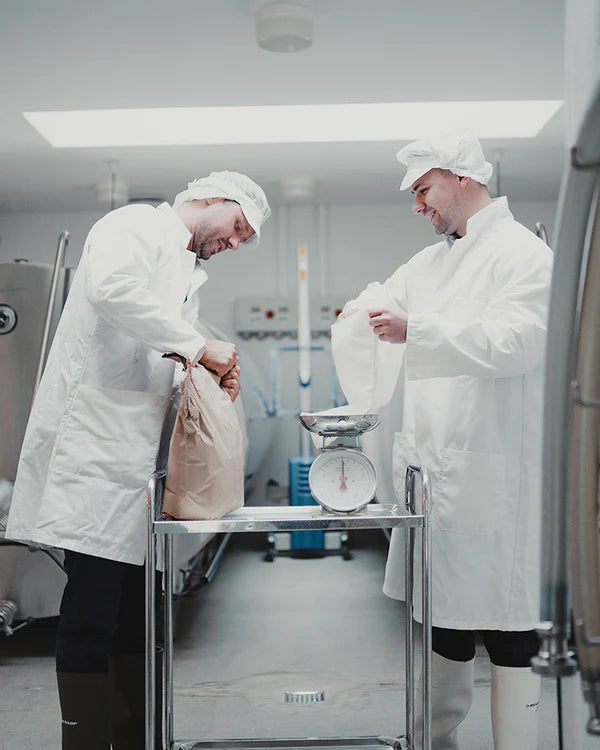By Dr Cliff Harvey
Unlike other probiotics that might contain a few strains of beneficial bacteria, and sometimes prebiotics to aid their efficacy, Vita Biosa provides a complex ecosystem of live, active probiotics.
Think of it this way, imagine parachuting into the desert with a few ration packs, versus taking an air-conditioned, fully serviced flight, direct to a self-sustaining resort…that’s the difference.
Vita Biosa is a unique combination of pre-, pro-, and post-biotics. That’s a fancy way of saying that it has beneficial bacteria to help your gut and overall health (probiotics), along with the foods that they feed on (prebiotics). It also has beneficial substrates (fuels) that these beneficial bacteria produce (post-biotics) such as short-chain fatty acids that help to improve your gut health, along with providing a readily usable fuel for your body (and brain!).
Vita Biosa contains:
- Around 2 billion CFU of eight strains of live, active, lactic acid bacteria per serving (Bifidobacterium lactis, Bifidobacterium longum, Lactobacillus acidophilus, Lactobacillus casei, Lactobacillus rhamnosus, Lactobacillus salivarius, Lactococcus lactis, Streptococcus thermophilus)
- Prebiotics to fuel the beneficial bacteria in Vita Biosa and in your gut!
- Postbiotics (Lactic acid and acetic acid) which helps to preserve the best pH (acidity level) for the beneficial bacteria to thrive, while inhibiting pathogens (‘bad bugs’!)
- These organic acids also provide valuable fuel for other beneficial bacteria in the gut, as well as providing fuel to the cells of the gut lining and to your entire body and brain!
- 19 organic herbs to help reduce inflammation and improve gut health, as well as provide additional nutrients.
"Vita Biosa is a complete, living, active ecosystem of health-promoting herbs, cellular fuels, organic acids, and a range of the most beneficial bacteria for the gut and overall health."
Conclusion:
Vita Biosa is more than just prebiotics and more than just probiotics! It’s a complete, living, active
ecosystem of health-promoting herbs, cellular fuels, organic acids, and a range of the most
beneficial bacteria for the gut and overall health.
Why is Gut Health Important?
The digestive system is the gateway to the body for most of the chemicals and compounds that we either want to take in (to nourish us) or keep out (because they are pathogens of harmful chemicals). So, it’s fair to say that the health of the digestive system affects the health of the whole body and that, as a result, ‘gut health’ is a hot topic for good reason.
About Dr Cliff Harvey

Dr Cliff Harvey is a registered clinical nutritionist, former world champion and world record-holding strength athlete, and researcher. He has been coaching people ranging from world champion athletes through to the chronically and acutely unwell to perform at their best, since the 1990s. Cliff’s master's degree research focussed on the use of medium-chain triglycerides to mitigate ‘keto-flu’ and encourage faster induction of nutritional ketosis, and his doctoral research on identifying markers of carbohydrate tolerance and appropriateness of different diets to individuals.
He is the founder of the Holistic Performance Institute, a private tertiary college, and is the author of many books including The Carbohydrate Appropriate Diet, the Ashton-Wylie Book Award finalist Time Rich, Cash Optional and The Credo: 8 Simple virtues for living with passion and purpose in the post-truth era.
References
1. Khalesi S, Bellissimo N, Vandelanotte C, Williams S, Stanley D, Irwin C. A review of probiotic supplementation in healthy adults: helpful or hype? European Journal of Clinical Nutrition. 2018.2. Mekkes MC, Weenen TC, Brummer RJ, Claassen E. The development of probiotic treatment in obesity: a review. Beneficial Microbes. 2013;5(1):19-28.
3. Pan J, Pan Q, Chen Y, Zhang H, Zheng X. Efficacy of probiotic supplement for gestational diabetes mellitus: a systematic review and meta-analysis. The Journal of Maternal-Fetal & Neonatal Medicine. 2017:1-7.
4. Akbari V, Hendijani F. Effects of probiotic supplementation in patients with type 2 diabetes: systematic review and meta-analysis. Nutrition reviews. 2016;74(12):774-84.
5. Hendijani F, Akbari V. Probiotic supplementation for management of cardiovascular risk factors in adults with type II diabetes: A systematic review and meta-analysis. Clinical Nutrition. 2018;37(2):532-41.
6. Pan H, Li R, Li T, Wang J, Liu L. Whether Probiotic Supplementation Benefits Rheumatoid Arthritis Patients: A Systematic Review and Meta-Analysis. Engineering. 2017;3(1):115-21.
7. Mansfield JA, Bergin SW, Cooper JR, Olsen CH. Comparative Probiotic Strain Efficacy in the Prevention of Eczema in Infants and Children: A Systematic Review and Meta-Analysis. Military Medicine. 2014;179(6):580-92.
8. Roman P, Carrillo-Trabalón F, Sánchez-Labraca N, Cañadas F, Estévez AF, Cardona D. Are probiotic treatments useful on fibromyalgia syndrome or chronic fatigue syndrome patients? A systematic review. Beneficial Microbes. 2018:1-10.
9. Pirbaglou M, Katz J, de Souza RJ, Stearns JC, Motamed M, Ritvo P. Probiotic supplementation can positively affect anxiety and depressive symptoms: a systematic review of randomized controlled trials. Nutrition Research. 2016;36(9):889-98.
10. Brenner LA, Stearns-Yoder KA, Hoffberg AS, Penzenik ME, Starosta AJ, Hernández TD, et al. Growing literature but limited evidence: A systematic review regarding prebiotic and probiotic interventions for those with traumatic brain injury and/or posttraumatic stress disorder. Brain, Behavior, and Immunity. 2017;65:57-67.
11. Kasatpibal N, Whitney JD, Saokaew S, Kengkla K, Heitkemper MM, Apisarnthanarak A. Effectiveness of Probiotic, Prebiotic, and Synbiotic Therapies in Reducing Postoperative Complications: A Systematic Review and Network Meta-analysis. Clinical Infectious Diseases. 2017;64(suppl_2):S153-S60.
12.Saez-Lara MJ, Gomez-Llorente C, Plaza-Diaz J, Gil A. The Role of Probiotic Lactic Acid Bacteria and Bifidobacteria in the Prevention and Treatment of Inflammatory Bowel Disease and Other Related Diseases: A Systematic Review of Randomized Human Clinical Trials. BioMed Research International. 2015;2015:15.



